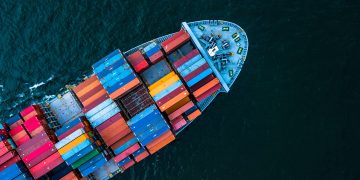The 6PAC+ Alliance, a coalition of Pacific, Caribbean and African Island nations, continues to push for watertight measures to deliver the International Maritime Organization (IMO) 2023 GHG Strategy in full.
At the core of our proposals is a call to establish a GHG levy as the centerpiece of mid-term measures. These measures are designed to eliminate greenhouse gas emissions from international shipping by 2050, with ambitious intermediate targets for 2030 and 2040 while ensuring a just and equitable transition, one that leaves no State and no seafarer behind.
The 6PAC+ submissions come at a critical juncture in international maritime decarbonization negotiations. The IMO must reach agreement on the basket of measures to implement its 2023 Strategy for decarbonising shipping in April 2025 and the measures need to be operational no later than 2027 to stay on track for a 1.5 degree-aligned pathway.
The GHG levy is a defining moment for global maritime policy. For frontline nations like ours, this is more than an environmental initiative—it’s about securing a just and sustainable future for all. This levy is not just an effective mechanism for reducing emissions but a vital tool to level the playing field, enabling the most vulnerable to not only survive but thrive in a rapidly changing world. The time to act is now, with a united global commitment that leaves no nation behind.
… said Ambassador Albon Ishoda, Marshall Islands Special Envoy for Maritime Decarbonization.
This requires agreement on the text for a new Chapter of International Convention on the Prevention of Pollution from Ships, more commonly known as MARPOL, the IMO’s global regulations for preventing pollution from ships. Annex VI of this Convention regulates substances from ships that are released into the air, and the new Chapter to this would set out legally binding regulations for GHG emissions from the ships.
6PAC+ is co-sponsoring a proposal alongside a diverse and growing number of countries from the Pacific, Caribbean, Europe, Africa, and Asia, as well as industry stakeholders. This proposal presents a consolidated draft text for the new Chapter 5 of MARPOL Annex VI, by proponents of a Universal GHG Levy.
Additional 6PAC+ proposals on the Goal of this new chapter and the Revenue Disbursement and Fund Management have received widespread support, from the Marshall Islands, Tuvalu, Fiji, Vanuatu, Solomon Islands, Kiribati, Tonga, Samoa, Nauru, Belize, and Palau. These endorsements highlight the universal appeal and scientific credibility of the Alliance’s strategy, which prioritizes both mitigation of the GHG emissions from shipping at source and fair reparation of the damage caused to people and the environment.
The GHG levy is a lifeline, a critical step toward a decarbonized shipping sector that doesn’t exacerbate the challenges we face but instead paves the way for a resilient and equitable transition for all.
… commented Special Envoy Ralph Regenvanu, Vanuatu Special Envoy for Climate Change and Environment
The Submissions
The Goal of the proposed new chapter to MARPOL Annex VI
To ensure measures will deliver on the IMO’s 2023 GHG Strategy, 6PAC+ proposes the following “goal” text: “Effectively promoting the energy transition of shipping and providing the world fleet with the needed incentive while contributing to a level playing field and a just and equitable transition.” This goal underscores the interconnected nature of environmental and economic equity. This submission does not provide a new goal text, but reiterates the unanimously adopted text from the 2023 GHG Strategy, to ensure negotiations do not water down the hard-fought compromise.
Consolidated Amendments to MARPOL Annex VI on a GHG Levy/Contribution
This submission builds upon the growing consensus around the unique ability of a Levy to achieve all the goals and objectives of the 2023 IMO Strategy. The amendments are expected to operationalise a mandatory levy on all GHG emissions from ships, set at rates informed by scientific analysis. The submission, which is broadly co-sponsored by developing countries, SIDS, LDCs, developed countries, and industry actors demonstrates that a levy/contribution is the only solution that can effectively promote the energy transition of shipping and provide the world fleet with a needed incentive while contributing to a level playing field and a just and equitable transition. By embedding this levy within the MARPOL Annex VI amendments, the framework ensures a robust, enforceable, and transparent mechanism for global shipping decarbonization.
Revenue Disbursement Proposal
The second submission outlines key revenue disbursement purposes for the byproduct revenues which would constitute the minimum required to achieve a Just and Equitable Transition that leaves no country and no one behind. These purposes include capacity building in SIDS and LDCs, workforce training, and infrastructure investments in eligible developing countries, in particular SIDS and LDCs, to support the energy transition. Revenues will also address disproportionately negative impacts (DNI) on vulnerable states, ensuring a holistic approach to mitigating economic and social challenges arising from the decarbonization measures.
Establishment of an IMO GHG Strategy Implementation Fund
This submission proposes the creation of a central Fund to manage and disburse revenues from the measures. Moving quickly to establishing the architecture for managing the revenues is essential for meeting the IMO’s ambitious timelines. The Fund’s governance framework includes dedicated representation for SIDS and LDCs, ensuring their needs are prioritized. It also emphasizes transparency and efficiency in revenue management, aligning with the IMO’s long-term strategy on greenhouse gas reductions.
To remind, the International Chamber of Shipping (ICS) and 47 governments have jointly proposed to the IMO a mandatory GHG emissions pricing mechanism for international shipping. The plan involves contributions based on CO2e emissions to an “IMO GHG Strategy Implementation Fund” to reduce the cost gap between zero/near-zero emission fuels and conventional fuels, accelerating green energy adoption.































































